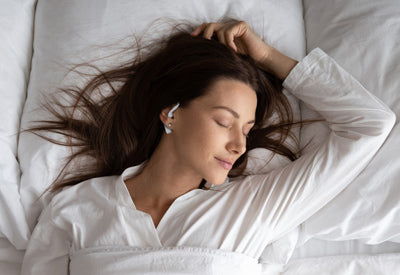
Sufferers of tinnitus know how aggravating the condition can be. It can lead to headaches, bad moods, and even keep you awake at night! For people with severe, or even mild symptoms of tinnitus, tinnitus maskers may be the best solution.
A tinnitus masker helps block the sound of tinnitus, giving sufferers some much-needed relief. Here's how and why tinnitus masking works.
What Are Tinnitus Maskers?
Tinnitus maskers have been used to give sufferers of tinnitus relief for over 50 years.
They were first conceptualized in the 70s by Dr. Jack Vernon, who wanted to find a way to alleviate tinnitus symptoms. He wondered if an external sound could mask an internal one, which eventually lead to the modern tinnitus maskers we have today.
A typical tinnitus masker is kind of like a hearing aid. It plugs into the patient's ear and generates low-level narrow-band and broad-band noises. These noises are specially designed to block out the ringing sound of tinnitus.
This noise can also be referred to as white noise.
Can I Get the Same Effect From a TV?
The sound from a tinnitus masker is very different than that of a TV.
The sound produced by a tinnitus masker is specially designed to block out tinnitus. It's meant to be background noise, not something that requires focus.
When watching TV, your mind will try and focus on one aspect of the sound. It might be the dialogue, the soundtrack, or any other sounds. Tinnitus masker noise blends in with tinnitus noise, keeping both in the background and letting you focus on sleep or relaxation.
What Does a Tinnitus Masker Sound Like?
Tinnitus maskers may produce a wide variety of sounds depending on the person and their case.
A tinnitus masker may play white or pink noise, a notched sound field, intermittent pulsed sounds, or even music in some cases. A tinnitus masker can also play natural noises, like birds or a crashing ocean. Some people find one type of sound works better than another, so some experimentation may be required on a case-by-case basis.
Why Do Tinnitus Maskers Work?
Tinnitus maskers work by adding background noise to a person's ears. This background noise blends in with the ringing of tinnitus, making it unnoticeable. Further, it relieves irritation by giving the user a much more soothing sound to listen to.
All tinnitus maskers can be adjusted depending on the severity of the tinnitus. Some people with tinnitus experience a soft ringing, while others hear a loud, piercing ringing. The market should be adjusted to match or surpass the level of the tinnitus, as to effectively drown it out.
The Lamp Analogy
There's a common analogy used to describe tinnitus maskers.
Think about a dark room. Now, imagine someone turning a lamp on and off inside that dark room. Of course, you're going to notice the light of the lamp as the rest of the room is pitch black.
Now, imagine someone turns on an overhead light in the room. You'll no longer notice the light of the lamp being turned on and off, as the rest of the room is full of light. The lamp light has effectively been masked.
In the same way the lamp light is overwhelmed by the overhead light, tinnitus is masked by a tinnitus masker. The white noise produced by the masker is much stronger than the sound of the tinnitus.
How Do I Know If a Tinnitus Masker Is for Me?
One simple home test may be enough to determine whether or not a tinnitus masker is for you.
When you can hear your tinnitus go into the bathroom or kitchen and turn on the sink. If the running water relieves you of your tinnitus, then a tinnitus masker will most likely help you. The sound of the tap is similar to the sound tinnitus maskers make, meaning you'll likely find relief in a masker.
If that isn't reliable enough for you, a simple visit to the doctor will lead you to the answer you need. The doctor will be able to test your hearing more in-depth, and determine whether tinnitus masking is a viable option. Tinnitus masking may not work for everyone, so the doctor may have another solution for you.
Are Tinnitus Maskers Just Hearing Aids?
Hearing aids and tinnitus maskers are not the same thing. However, they are very similar, and you can get combination sharing aids and tinnitus maskers.
Tinnitus is deeply connected to hearing loss. It may be a precursor to hearing loss in some cases. Considering this, many people have a need for both a hearing aid and a tinnitus masker.
Buying a hearing aid that doubles as a tinnitus masker saves you the trouble of switching devices regularly. Instead, you can just wear your hearing aid to experience relief from tinnitus. This is especially helpful for older people who don't want to go through the hassle of handling two devices.
What Are the Best Tinnitus Maskers?
There are plenty of tinnitus maskers out there, but not all of them work equally.
The best thing you can do is ask your doctor. If you suffer from hearing loss, look for a tinnitus-hearing-aid combo. If you just want a tinnitus masker, a simple white noise machine might do for you!
You could also try something like the SoundOff. This device can be used to block out snoring, as well as mask tinnitus. It emits a range of noise, from white to pink, to give you the tinnitus relief you need.
Plus, it's comfortable and affordable. What's better than that?
Find Relief for Your Tinnitus Today
Nobody deserves to suffer through tinnitus. If you're tired of being kept up at night by your tinnitus, try out a tinnitus masker today. Tinnitus maskers have helped countless tinnitus sufferers find lasting relief, and get the deep sleep they deserve.
Tinnitus isn't the only issue that can keep a person up, though. If your spouse's snoring is keeping you up, buy the SoundOffSleep noise masking device today. You'll love what it does for your nights.


